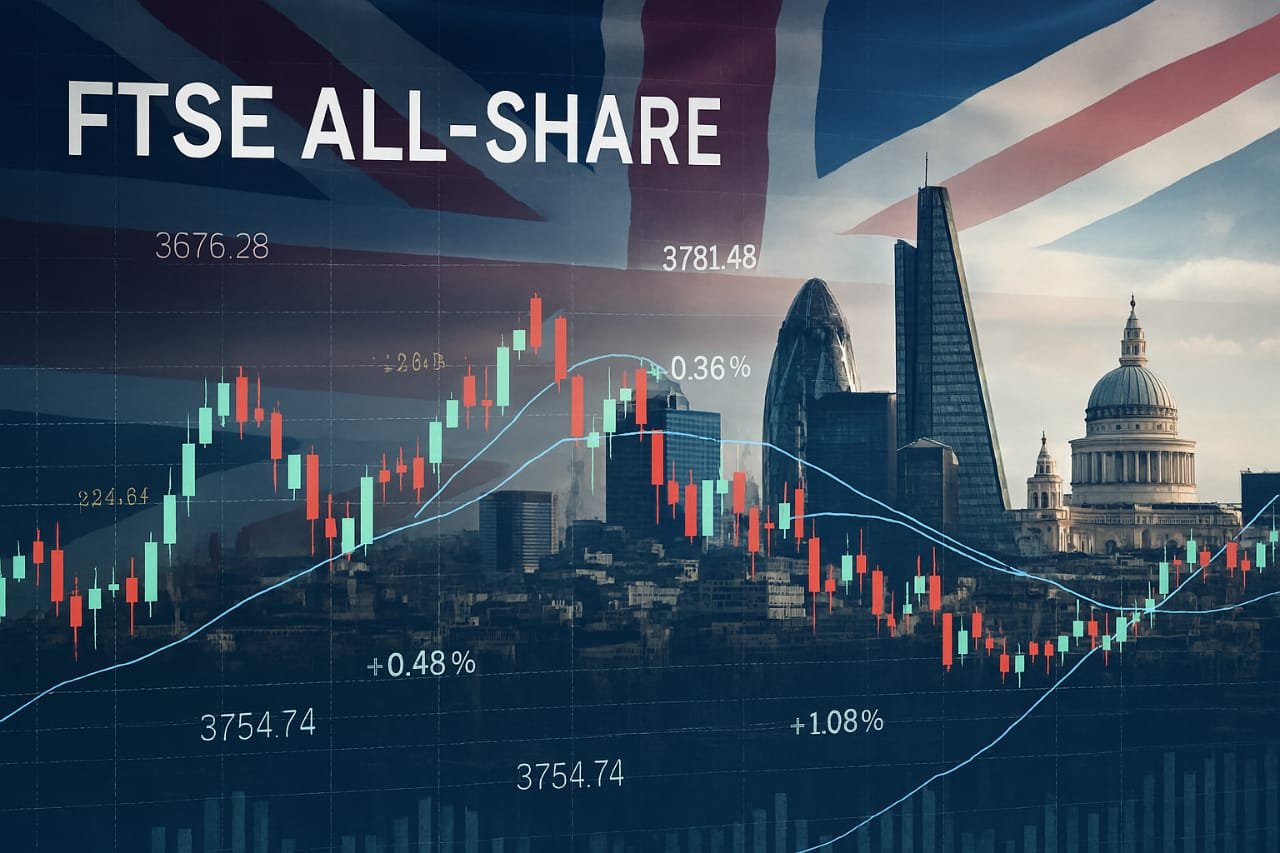FTSE All Share: Understanding the UK’s Market Pulse with Key Insights & Investor Tips
When most people think of stock indices, names like the Dow Jones, Nasdaq, or S&P 500 spring to mind. But for those with an eye on the UK market—or aiming for a well-rounded global portfolio—there’s another powerful index worth understanding: the FTSE All Share.

It might not carry the glamour of Wall Street giants, but this index offers a clear, comprehensive picture of the UK stock market’s health. So, what is the FTSE All Share Index? How is it different from other indices? And what role can it play in your investment strategy?
Let’s unpack everything you need to know.
📌 What Is the FTSE All Share Index?
The FTSE All Share Index, managed by FTSE Russell, represents approximately 98% of the UK’s market capitalization. This means nearly all listed companies on the London Stock Exchange’s main market are included.
Unlike narrower indices such as the FTSE 100 (which tracks the largest 100 companies), the FTSE All Share combines the:
-
FTSE 100 (large-cap)
-
FTSE 250 (mid-cap)
-
FTSE SmallCap Index
Together, they form a much more holistic view of the UK’s economic and corporate landscape.
🔍 Why the FTSE All Share Matters
Here’s why investors, analysts, and financial professionals often prefer the FTSE All Share as a benchmark:
-
Diverse Sector Exposure: From banks to biotech, the index spans multiple industries.
-
Broad Market Sentiment: Provides insight into the UK economy as a whole, rather than just its largest players.
-
Performance Tracker: Often used as a reference point for actively managed UK equity funds.
💡 Interesting Insight: Many pension funds in the UK benchmark their performance against the FTSE All Share due to its broad coverage.
🆚 FTSE All Share vs. Other Indices
Understanding how the FTSE All Share compares to other well-known indices can help investors choose the right tools for analysis and portfolio strategy.
| Index | Coverage | Market Cap Focus | Region |
|---|---|---|---|
| FTSE 100 | 100 largest UK companies | Large-cap | UK |
| FTSE 250 | Next 250 UK companies | Mid-cap | UK |
| FTSE All Share | FTSE 100 + FTSE 250 + SmallCap | Large to small-cap | UK |
| S&P 500 | 500 top US companies | Large-cap | US |
| MSCI World | Over 1,500 companies worldwide | Developed markets globally | Global |
🔗 Want to compare it in more detail? FTSE Russell’s official page offers real-time data and breakdowns.
💼 Key Components of the FTSE All Share
The index is market-cap weighted, meaning larger companies have a bigger impact. Here are some of the top sectors represented:
-
Financial Services (banks, insurers)
-
Energy (oil & gas giants)
-
Consumer Goods (retail, food producers)
-
Industrials
-
Healthcare
Notable names you’ll find in the FTSE All Share include:
-
HSBC Holdings
-
BP
-
Unilever
-
GlaxoSmithKline
-
AstraZeneca
Even if you invest in a FTSE 100 fund, you’re only seeing a slice of the market. The FTSE All Share helps you see everything from giants to emerging players.
📊 Performance Trends Over Time
While past performance isn’t a guarantee of future results, it helps to understand the historic behavior of the UK All Share Index.
📈 Historical Growth
According to data from Morningstar, the FTSE All Share has shown modest yet steady growth, averaging around 7-8% annual returns (including dividends) over the long term.
📉 During Crises
-
2008 Financial Crash: The index dropped by over 30%.
-
COVID-19 Pandemic (2020): Saw a sharp decline but rebounded quickly by mid-2021.
-
2022-23 Inflationary Pressures: Modest returns, largely driven by energy and healthcare sectors.
This shows the UK All Share Index is not immune to global shocks but often recovers with the broader market.
🧠 Personal Experience: Why I Use the FTSE All Share
As someone who started investing with a focus on international growth, I initially overlooked the UK market. But a few years ago, I shifted a portion of my portfolio into an FTSE All Share ETF.
Why?
-
Dividend Yield: UK companies often pay higher dividends compared to their US peers.
-
Diversification: The All Share index offered exposure to small-cap opportunities I couldn’t get from the FTSE 100 alone.
-
Cost-Effective: ETFs tracking the UK All Share Index often come with low expense ratios, making them ideal for long-term holding.

One of my best decisions was pairing it with a US S&P 500 ETF, which gave me balance between growth and income.
🧩 FTSE All Share: Key Benefits for Investors
Let’s summarize the core advantages of including this index in your portfolio:
✅ Broad Exposure
Covers almost the entire UK market, reducing the concentration risk seen in smaller indices.
✅ Income Potential
The UK All Share Index is often rich in dividend-paying stocks, ideal for income-focused investors.
✅ Benchmark Utility
Acts as a performance benchmark for UK-focused mutual funds and ETFs.
✅ Liquidity
Thanks to the inclusion of large and mid-cap stocks, most constituents have high trading volumes.
🚧 Risks & Considerations
Despite its strengths, investors should be aware of potential drawbacks:
-
UK Market Dependency: Heavily influenced by domestic politics, currency risk, and Brexit-related challenges.
-
Sector Imbalance: Overweight exposure to traditional sectors like energy and finance, which may underperform in a tech-led market.
-
Lower Tech Exposure: Compared to the Nasdaq or S&P 500, the index has less representation from high-growth tech stocks.
💡 Investing in the FTSE All Share: How to Get Started
You can gain exposure to the UK All Share Index through:
🟢 ETFs (Exchange Traded Funds)
Popular UK All Share ETFs include:
-
iShares Core FTSE All Share UCITS ETF
-
Vanguard FTSE UK All Share Index Unit Trust
🟢 Mutual Funds
Many UK equity mutual funds use the UK All Share Index as their benchmark, and often mimic its holdings.
🟢 Index-Tracking Pensions
If you’re investing through a UK pension fund, there’s a good chance it already includes UK All Share Index exposure.
🌐 Internal & External Resources
Explore more with these relevant articles:
📢 Final Thoughts: Should You Track or Invest in the FTSE All Share?
If you’re aiming for broad UK market exposure, the UK All Share Index is one of the most efficient tools to do so. It offers a well-rounded view of the economy, blending stability from blue chips with the growth potential of smaller companies.

Whether you’re a beginner exploring ETFs or an experienced investor adjusting your portfolio, understanding the UK All Share Index can help you make smarter, more diversified decisions.
🔔 Call to Action
What’s your take on the UK market?
Have you invested in UK All Share Indexe funds or considered them as part of your portfolio?
👉 Leave a comment, explore more investment strategies here, and subscribe to our newsletter for weekly insights on global indices and smart investing tips!
